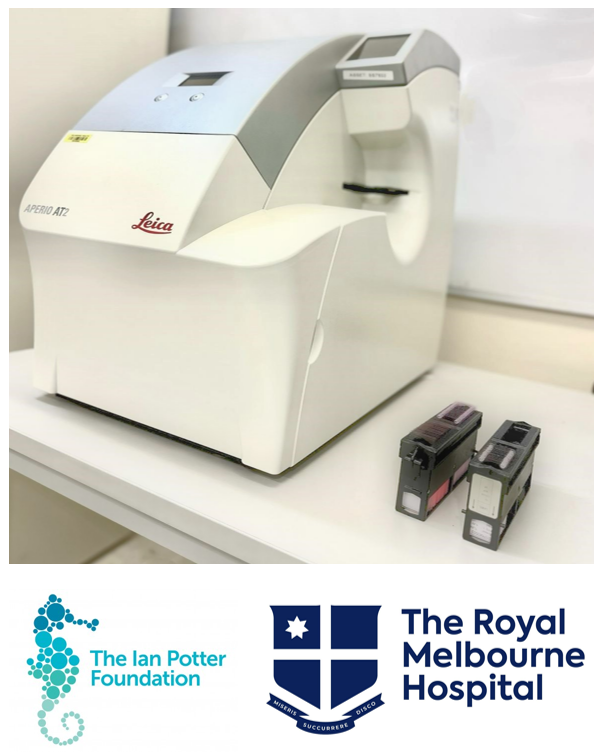We are now equipped with a high throughput Aperio AT2® slide scanner through our consortium member, Melbourne Health Tissue Bank at Royal Melbourne Hospital (RMH).
This is a major upgrade of our infrastructure in delivering ultra-high throughput digital pathology imaging services for research. The Aperio AT2® slide scanner is capable of automated high-definition scanning at 20x or 40x magnification of up to 400 slides at a time. Furthermore, a fast and secure image transfer pathway is established through Box® to provide rapid and seamless download of images to kickstart your research.
This new infrastructure allows us to establish a ‘Virtual Biobank’ - digitised repository of biospecimen and provide additional services to support more critical research projects. The applications for digital pathology imaging include (not limited to) remote verification of specimen tumour content and quality, more secured and easy storage of pathology images (as compared to physical slides), R&D on AI for pathology diagnosis.
You can now have access to H&E tissue images from our specimens and professional digital imaging services for your FFPE tissue sections.

Library of digital images and their associated metadata
Assisting you with high-quality scans of your tissue slides
VCB 'Virtual biobank' and digital biospecimens
At the VCB, we always aim to maximise the potential of our resources to pave the way for breakthrough research and advancements in oncology. Through this capability, we are creating a digitised repository of H&E stained FFPE tissue sections that can be re-distributed to benefit more research projects. These images can be accessed as standalone materials or as complementary materials with other biospecimens. As the repository is continuously being built through ongoing project servicing, they may be readily available digitally or created from our FFPE tissue library.
As part of the implementation, we have created the initial cohort in this ‘virtual biobank’. The cohort showcases a digital library of non-small cell lung cancer (NSCLC) - Adenocarcinoma H&E images with a range of available associated biospecimens. Contributing from all five consortium member tissue banks, the newly established cohort currently has 105 participants with the following features:
- Available in cancer stages I, II, and III
- Tumour content and tissue quality verified by pathologist
- 69% of cases have matched plasma or serum
- 67% of cases have matched snap frozen tissue
- Common risk factor data available, i.e. age of diagnosis, gender and smoking status
- Over 90% of cases are linked to the Victorian Cancer Registry, offering a longitudinal perspective of samples
This is a representative image of an H&E FFPE 4um section from our initial NSCLC cohort.
The tissue presents a poorly differentiated adenocarcinoma of lung from our donor recruited through RMH. The scanned tissue in 20x magnification shows an 80% tumour content with 30% necrosis (as verified by a pathologist), possessing high value for any downstream analysis to study about the cancer.
For any interest in building and/or accessing a cohort to meet the criteria for your research questions, please contact us for collaboration. Refer to Our Services for pricing guide.
Digital pathology scanning services
We also offer digital imaging services for digitising the FFPE sections of your specimens through the new Aperio AT2® system.
The services are highly customisable to your needs, such as 20 or 40x magnification, scanning areas, high throughput. Additional services may be provided as part of our histology services, including FFPE tissue preparation, tissue sectioning, H&E staining, pathology verification (subject to pathologist availability).
Enquire with us through the link below if you require digital imaging services.
Visit our Project Establishment below page for more information. For pricing guide, refer to our section below.
RMH personnel
For RMH researchers who require only digital scanning services please contact 03 9342 4915.
Pricing
'Virtual Biobank'
|
| |
Academic |
Academic (Partner) |
Commercial |
| Per Image |
$15 |
$12 |
$30 |
| Digital Library Curation |
$50 |
$40 |
$100 |
Slide Scanning Services
|
| Setup |
$18 |
$15 |
$30 |
| Slide Scanning (20x Magnification Resolution) |
$8 |
$7 |
$14 |
| Slide Scanning (40x Magnification Resolution) |
$12 |
$10 |
$20 |
Note:
- Pathology Report provided complimentary for H&E images of ‘Virtual Biobank’.
- Complimentary H&E scan provided with FFPE slide requests.
- Prices are a guideline only and are subject to change without notice.
- Additional service fee’s may apply depending on the nature of the request.
- Bulk price may be available for large requests, please contact us to discuss.
- All prices are in AUD.
- Partner rate applies to partners only (e.g. consortium members).
- Commercial rate applies to any projects that have direct commercial interest.
- To ensure our clients benefit from the funding support, our cost-recovery does not include the cost of infrastructure acquisition and implementation.
Acknowledgements
We would like to thank Ian Potter Foundation and the Victorian Government through Victorian Cancer Agency for the funding support to establish this capability. We thank the Royal Melbourne Hospital, including RMH Foundation, IT Department, Pathology Department and Dr. Michael Christie for their generous in-kind support in establishing the infrastructure. This infrastructure is housed at Melbourne Health Tissue Bank, RMH.